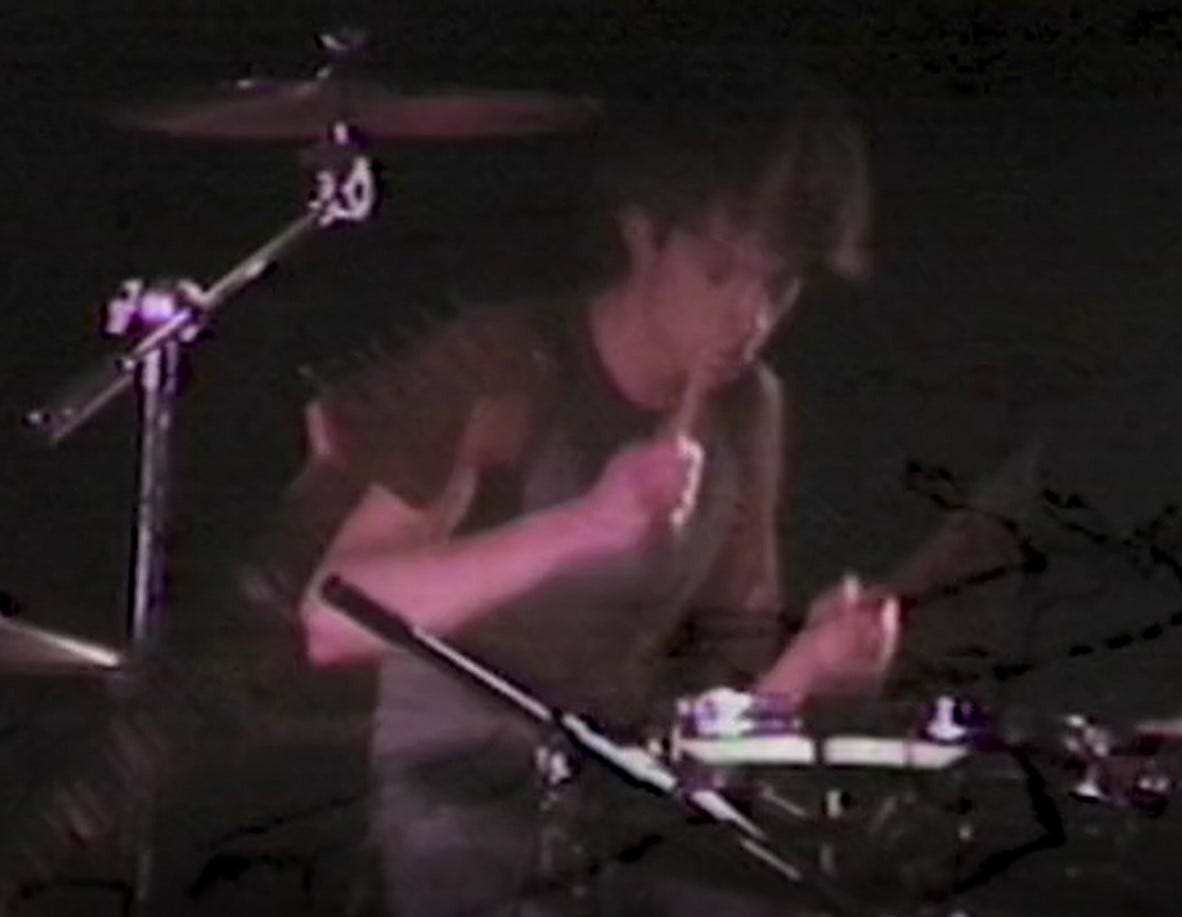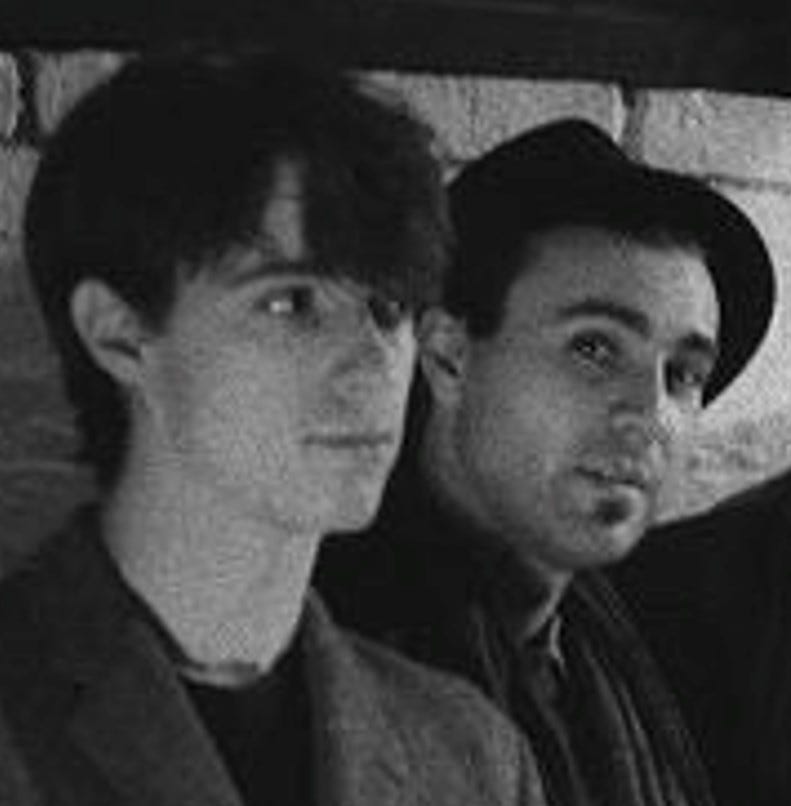Fred Maher Interview
talks about starting his music career in Zu Band and Material
Once again it is my great pleasure to continue the interview series with Fred Maher. He started playing the drums as a kid, and was still only 14 when he met Bill Laswell and joined the newly forming Zu Band. Fred tells us how that happened, and how Zu Band would become Material.
Fred Maher Interview
Imagine this. You’re 14 years old. You love music and you’ve been playing an instrument long enough to form a band with your buddies. It’s fun, and you’re starting to meet others who share the love of the music you listen to and are now attempting to play. Sound familiar? Some version of this happened to many of us as we were growing up in the 70’s. In fact, it’s safe to say that most of you who are reading this probably share a musical bond with many of the friends you still have to this day. I do. For Fred Maher, these early bonds would blossom into a life long career in music.
At 14, Fred was playing drums in a band called 1121. They weren’t gigging much, or really at all, but they rehearsed a lot. Their music of choice was progressive rock. It wasn’t easy to play. It also wasn’t fashionable in 1978. Punk rock had been pushing prog to the sidelines. But Fred still remembers going to his first concerts at huge venues featuring Emerson Lake and Palmer with an orchestra, and Yes, where his seat was in the last row of a baseball stadium.
How Fred ended up playing drums seems more an act of random chance rather than any love for drums that Fred may have harbored. The way he tells it, his parents started him with violin lessons, but that conflicted with the Batman show on tv, so out went the violin lessons. He next had a choice between sax or drums at a nearby music school. Drums won because sax lessons interfered with Saturday morning cartoons. Private lessons would follow, but Fred preferred taking his own path and began teaching himself to play along with his favorite records. Wouldn’t that be fun now to see video of a young Fred Maher bashing along to Yes’s “The Gates of Delirium” or ELP’s “Karn Evil 9”. (Don’t go looking for that on Youtube.)
The 1121 band may have been out of fashion for some, but not all. Two “fans” that would soon turn into friends would be Martin Bisi and Michael Beinhorn. Michael had been playing synth for a couple of years, and Martin had some technical skills that would see him running the fog machine for 1121. Fred recalls that the band played all of one gig, and Michael wasn’t in that, although he did join them for one rehearsal. More importantly, this trio of Fred, Michael and Martin started hanging out together.
Of course, one of their favorite activities was going to the record store. Near them on the north end of Manhattan was Pantasia Recorz (with a ‘z’). This shop specialized in European imports of progressive avant-garde music. By 1978, the owner of Pantasia opened a second store that was supposed to be across the street from a new venue being opened by CBGBs. This venue would never really get off the ground, so the “downtown” Pantasia would be short lived. However, it lasted long enough to get our young trio to venture into this slightly scary area of NYC. On one of their trips, Fred and Michael noticed fliers advertising for like minded musicians into bands such as Kraftwerk, Van Der Graff, Hawkwind, Magma, Soft Machine and more. Eureka! They had to check this out, so Fred called the number.
They’re invited to a meeting at a barren industrial looking space near the downtown area. The two guys they meet are older than them, one quite a bit older. This elder of the two does most of the talking, and he’s soon telling our young trio of his plans to make music that will change the world. His name is Giorgio Gomelsky, a name that Fred recognized from albums he had in his collection which were produced by Giorgio. The other guy, who didn’t say too much, they didn’t recognize, but they would soon be jamming with this bass player in the ample rehearsal space in the building.
At those early jam sessions, Fred knew right away that this amazing bass player, Bill Laswell, was outclassing them all. They were jamming with no songs and little structure. Although somewhat nervous, Fred quickly learned that playing with someone much better than you is not only inspiring, it rubs off. He felt fortunate to find himself in this unique situation.
Joining them in these early sessions was guitarist Cliff Cultreri. Cliff was a long time employee at Pantasia – in fact he was employee #1 back in 1974. He knew all of these musicians as regular customers of the shop. He wanted in on this new band. And with that, the Zu Band was formed.
They are soon rehearsing songs that they will perform at a major festival being organized by Giorgio. The Zu Manifestival would be more than 12 hours long and feature musicians from the European rock avant-garde that Giorgio had worked with before he moved to NY. For Fred Maher this would be a chance to not only meet some of his heroes, but to play with them. Giorgio’s place, then called the Zu House, would be where they all would meet and form bands for the festival. Invited guests included Fred Frith and Chris Cutler from the band Henry Cow, Yochk'o Seffer from the band Magma, and the headliner for the fest Daevid Allen from Gong. Some of these musicians would make NY their home after the fest.
Related Stories
What would happen to Fred Maher next he would call one of the greatest experiences of his life. He was about to embark on a two month tour in a dilapidated school bus. He’s barely 16 now and still in high school. He manages to talk his parents into allowing him to drop out of school, as long as he completes his GED upon return from the tour. Fred learned a lot very quickly about playing the drums. He also learned how to push a broke down school bus to a service station.
When they get back from this tour, Giorgio tells them he has a recording session booked in Woodstock. An old friend of Giorgio’s has relocated his studio from England, and it is now set up at Levon Helm’s place. Levon was the drummer with The Band. The old friend of Giorgio’s was recording engineer Eddy Offord. Fred and everyone else in Zu Band was very familiar with who Eddy Offord was from his days recording Yes and ELP. Giorgio knew him when he was a young junior engineer at Advision Studios in London helping him record the Yardbirds and John McLaughlin’s first solo album “Extrapolation”, along with other records.
For a boy that had never traveled further than Long Island from his Manhattan home, Fred Maher had come a long way. He was now in a studio with the prog engineer he had been listening to for years on records. He now had to play drums on four songs to be recorded in one day. Think he was nervous? According to Fred, the songs had been well honed on tour. Sure he was nervous, but he also felt like he was in good hands. Offord clearly knew what he was doing in the studio, and Gomelsky made some great food. His other vivid memory in the studio was getting to play with one of the first polyphonic synths, a Prophet 5. Well, Michael got to play with it anyway.
They went into the studio as Zu Band and recorded the songs. They would then spend another month touring France, again with Daevid Allen who made France his home before coming to NY. After they returned from France, something happened to the Zu Band. Those 4 songs they had just recorded would get released on the EP “Temporary Music 1”, and the band would rename themselves Material. As a band they had decided to move away from Giorgio Gomelsky, the man that got them started. Fred called it an act of rebellion, not remembering anything specific that might have driven them apart. Perhaps Giorgio, being much older than them, seemed too old school in his style as manager/producer. Perhaps they just wanted to produce themselves, which is exactly what they would end up doing.
At this point in our story, Fred’s music career is well launched. Material would get their own studio built in Brooklyn. They would all become music producers, with the exception of Cliff Cultreri who would become an A&R executive at Relativity records, responsible for signing Joe Satrianni and Steve Vai, among others, to their first recording contracts. Fred would continue to work with Laswell, and Fred Frith would join them to form the band Massacre who would record one of the heaviest and most aggressive avant-rock albums of the day called “Killing Time”. Fred’s eventual production credits would include Scritti Politti’s best selling album, a band he also joined, and Lou Reed’s highly regarded solo album “New York” whom he would also tour with.
Not too shabby for a kid who started on drums so that he could watch cartoons.
Special thanks to:
Merrill Aldighieri
From the HURRAH Archive, PRIVATE STREAMINGS
where you can find concert videos of Material, Massacre and many more





I keep learning as I keep reading your articles. Thank you for sharing.
I love the NYC downtown scene. You are on quite a roll!! Keep ‘em comin’!